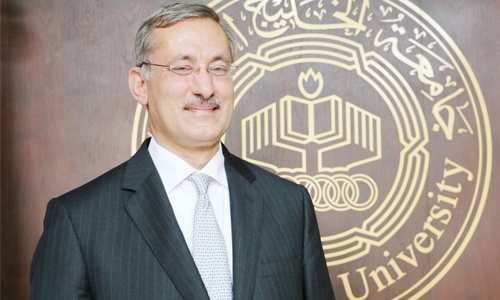Innovation for competitiveness in GCC Region: New impreatives
Innovation in GCC is key to enable the region to cope with the post-oil era. The imperatives for innovation-based economy in GCC include securing jobs for young population and meeting the demand for water, energy and food. Realizing that fact that by 2020 the GCC population will grow to be a bout 50 million; the real GDP is projected to amount to 2 trillion dollar in 2020 compared to about 300 billion in 2000; and food imports are projected to grow to US$53 billion by 2020, all these indicators exert immense pressures on both environment and economy and a mandate for action.
A transition to a sustainable economy in GCC implies a set of strategic measures in key sectors including energy, water, finance, health and education. Sustainable innovation requires investment is value-added products in petrochemicals, cleaner fuels, and desalination technology. Besides, green transition requires a reform of energy policy that entails investing in renewable fuels and clean technology. Despite the fact that the recipe for reform seems common sense but it requires a systemic approach to address the key enablers of the national innovation system which includes human capital, education sector and R&D, private sector, and policy framework.
In the last decade, the GCC had embarked on key inverstments in R&D as manifested in MASDAR, KACST, KAUST, and KAPSARC to support key sectors like oil and gas, petrochemicals, and water desalination. In essence, innovation in GCC hinges on enhancing the linkeages in national innovation systems which in turn will enable the emergence of new technologies and nurture a culture of sustainable innovation. The example of ALBA aluminum industries in Bahrain is a good example for knowledge-intensive industry that create jobs. However, investing in non-oil minerals like gold, silver, copper and bauxite help diversity GCC economy and provide opportunities for new technologies including recycling of mineral deposits from desalination like magnesium. Innovation in water technologies offer new opportunites to diversity energy sources and enhance efficiency since the GCC economies account for more than 40% of the world’s water desalination capacity.
The key question is how to overeome the technological and innovation intertia. One insight can be learned from behavioral theory which argues that decision making in institutions represents a barrier to innovation. Hence, organizational innovation is to be driven by a sense of urgency to develop adequate economic and environmental policy. Also, technological innovation is necessary for developing countries to catch up with industrialized nations. Technology policy contributes to create new knowledge and innovation-based growth through investment in cutting edge research to enable nations to move up the technology frontier. Specifically, solar energy is a promising technology due to the abundance of solar resource potential and the technological innovations in solar energy, like photovoltaic (PV). According to IRENA (2016), about 60% of the GCC’s surface area is adequate for solar PV deployment, and developing just 1% of this area could create almost 470 gigawatts (GW) of additional power-generation capacity. A transition to renewable energy could result in cumulative savings for the region of 2.5 billion barrels of oil equivalent (2015-2030), leading to overall savings of USD 55 billion to USD 87 billion and a reduction of carbon emissions around 1 gigatonne (Gt) by 2030, resulting in an 8% reduction in the region’s per capita carbon footprint. This has prompted Saudi Aramco to consider around 300 MW of solar and wind projects at 10 remote locations, replacing around 1 million barrels of liquid fossil fuels per day.
On another front, innovation in finance, business models and partnerships are crucial in the era of FinTech. The GCC and Bahrain in particular can be an enabler for a vibrant FinTech ecosystem to stimulate new jobs opportunities and support an ecosystem for innovation in several sectors, including e-banking, software development, e-consulting, financial engineering and data analytics. Innovation pays-offs and this evident as we see that FinTech has jumped three-fold between 2008 and 2014, reaching US$3 billion and is expected to reach 8 billion by 2018.
In sum, one key lesson is that to sustain innovation, it is key to harness human capital, knowledge and finance to unlock the potential of possibilities. However, an opportunity needs a prepared mindset.
Head of Innovation and Technology Management, Arabian Gulf University, Bahrain, Odeh Al-Jayyousi, auther of several books in sustainability, energy and a recent book titled Integral Innovation (2017), Ruteledge, UK.
Related Posts

